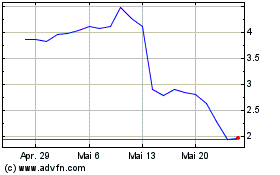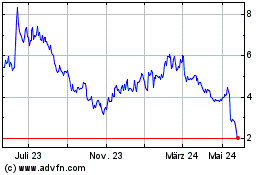Akoya Biosciences Announces that Garry Nolan, Ph.D., James Allison, Ph.D., and Padmanee Sharma, M.D., Ph.D., Join Newly Created Scientific Advisory Board
10 Januar 2024 - 2:00PM

Akoya Biosciences, Inc., (NASDAQ: AKYA), The Spatial Biology
Company®, today announced the establishment of its Scientific
Advisory Board (SAB) to provide strategic guidance and consult on
the Company's efforts to deliver spatial biology solutions for the
life sciences industry, from discovery to diagnostics.
The initial members of Akoya’s Scientific Advisory Board
are:
- Garry Nolan, Ph.D.,
Rachford and Carlota A. Harris Professor in the Department of
Pathology at Stanford University School of Medicine, co-founder of
Akoya Biosciences and inventor of the CODEX technology (now
PhenoCycler)
- James Allison,
Ph.D., Regental Professor and Chair of the Department of
Immunology, the Olga Keith Wiess Distinguished University Chair for
Cancer Research, and Director of the James P. Allison Institute at
The University of Texas MD Anderson Cancer Center; recipient of the
2018 Nobel Prize in Physiology or Medicine
- Padmanee Sharma, M.D.,
Ph.D., Professor in the Departments of Genitourinary
Medical Oncology and Immunology, Associate VP of Immunobiology, the
T.C. and Jeanette D. Hsu Endowed Chair in Cell Biology, and
Director of Scientific Programs for the James P. Allison Institute
at MD Anderson
"Our SAB includes leaders in immunotherapy, immunobiology and
innovation with deep knowledge and experience in translational
research, the discovery of ground-breaking clinical therapies and
the development of disruptive and high impact technologies," said
Brian McKelligon, Chief Executive Officer of Akoya Biosciences. "By
bringing together experts with unparalleled track records of
success, the SAB will enable us to better serve customer needs,
accelerate our leadership position in spatial biology, and support
Akoya’s mission to catalyze discovery and improve patient
care."
Garry Nolan, Ph.D.
Professor Nolan will transition from his role on the Akoya Board
of Directors to Chair of the SAB. He co-founded Akoya Biosciences
in 2015 and is the Rachford and Carlota A. Harris Professor in the
Department of Pathology at Stanford University School of Medicine.
As a co-inventor of the CODEX technology, Garry has focused his
research efforts on developing novel technologies and computational
methods for research into cancer, leukemia, immunology, and
autoimmune disease. Professor Nolan was the founder of a number of
life sciences companies in addition to Akoya, including Rigel Inc.
(NASDAQ: RIGL), DVS Sciences (purchased by Fluidigm), Nodality,
Inc., BINA (sold to Roche Diagnostics), Apprise (sold to Roche
Sequencing Solutions), Scale Bio (single cell ATAC, RNA, and
protein), and serves as an advisor and board member for several
biotechnology companies. He has published over 350 research
articles and is the holder of 50 US patents and has been honored as
one of the top 25 inventors at Stanford University. He trained with
Leonard Herzenberg (for his Ph.D.) and Nobelist Dr. David Baltimore
for postdoctoral work. Professor Nolan is the first recipient of
the Teal Innovator Award (2012) from the Department of Defense and
has been honored with a number of awards including Nature
Publishing “Outstanding Research Achievement”, Stohlman Scholar
from the Leukemia and Lymphoma Society and Burroughs Wellcome Fund
New Investigator Award.
James Allison, Ph.D.
Dr. Allison has spent a distinguished career studying the
regulation of T cell responses and developing strategies for cancer
immunotherapy. He earned the 2018 Nobel Prize in Physiology or
Medicine, which he shared with Dr. Tasuku Honjo, "for their
discovery of cancer therapy by inhibition of negative immune
regulation." Among his most notable discoveries are the
determination of the T cell receptor structure and that CD28 is the
major costimulatory molecule that allows full activation of naïve T
cells and prevents anergy in T cell clones. His lab resolved a
major controversy by demonstrating that CTLA-4 inhibits T-cell
activation by opposing CD28-mediated costimulation and that
blockade of CTLA-4 could enhance T cell responses, leading to tumor
rejection in animal models. This finding and a great deal of
persistence paved the way for the field of immune checkpoint
blockade therapy for cancer. Work in his lab led to the development
of ipilimumab, an antibody to human CTLA-4 and the first immune
checkpoint blockade therapy approved by the FDA. Among many honors,
he is a member of the National Academies of Science and Medicine
and received the Lasker-Debakey Clinical Medical Research award in
2015. His current work seeks to improve immune checkpoint blockade
therapies currently used to identify new targets to unleash the
immune system in order to eradicate cancer.
Padmanee Sharma, M.D., Ph.D.
Dr. Sharma has written and conducted multiple innovative
immunotherapy clinical trials, with an emphasis on obtaining
patients’ tumor samples for in-depth laboratory studies, including
the first neoadjuvant trial with immune checkpoint therapy and
first clinical trial with immune checkpoint therapy for patients
with bladder cancer. Her studies have identified novel resistance
mechanisms to immune checkpoint therapy, including loss of
interferon (IFN) signaling, VISTA⁺ immunosuppressive cells,
increased EZH2 expression in T cells, TGFβ signaling in bone
metastases, and CD73⁺ myeloid cells in GBM. These data have led to
initiation of new research studies focused on developing rational
combination immunotherapy strategies for the treatment of cancer
patients. As a result of her outstanding contributions to the field
of cancer immunotherapy, Dr. Sharma was selected as a member of the
American Society for Clinical Investigation (ASCI) and was awarded
the Emil Frei III Award for Excellence in Translational Research in
2016, the Coley Award for Distinguished Research for Tumor
Immunology in 2018, the Women in Science with Excellence (WISE)
Award in 2020, the Heath Memorial Award in 2021 and the Randall
Prize for Excellence in Cancer Research in 2021.
Disclosure
Dr. Allison and Dr. Sharma receive financial and equity
compensation as members of Akoya’s SAB, and these financial
relationships have been disclosed to MD Anderson’s Conflict of
Interest Committee in accordance with institutional policy.
Forward-Looking Statements
This press release contains forward-looking statements that are
based on management’s beliefs and assumptions and on information
currently available to management. All statements contained in this
release other than statements of historical fact are
forward-looking statements, including statements regarding our
expectations about the potential of our products and services, our
ability to develop, commercialize and achieve market acceptance of
our current and planned products and services, our research and
development efforts, our ability to execute on our plans and
expectations, our future performance and other matters regarding
our business strategies and plans and objectives for future
operations.
In some cases, you can identify forward-looking statements by
the words “may,” “will,” “could,” “would,” “should,” “expect,”
“intend,” “plan,” “anticipate,” “believe,” “estimate,” “predict,”
“project,” “potential,” “continue,” “ongoing” or the negative of
these terms or other comparable terminology, although not all
forward-looking statements contain these words. These statements
involve risks, uncertainties and other factors that may cause
actual results, levels of activity, performance, or achievements to
be materially different from the information expressed or implied
by these forward-looking statements. These risks, uncertainties and
other factors are described under "Risk Factors," "Management's
Discussion and Analysis of Financial Condition and Results of
Operations" and elsewhere in the documents we file with the
Securities and Exchange Commission from time to time. We caution
you that forward-looking statements are based on a combination of
facts and factors currently known by us and our projections of the
future, about which we cannot be certain. As a result, the
forward-looking statements may not prove to be accurate. The
forward-looking statements in this press release represent our
views as of the date hereof. We undertake no obligation to update
any forward-looking statements for any reason, except as required
by law.
About Akoya Biosciences
As The Spatial Biology Company®, Akoya Biosciences’ mission is
to bring context to the world of biology and human health through
the power of spatial phenotyping. The company offers comprehensive
single-cell imaging solutions that allow researchers to phenotype
cells with spatial context and visualize how they organize and
interact to influence disease progression and response to therapy.
Akoya offers a full continuum of spatial phenotyping solutions to
serve the diverse needs of researchers across discovery,
translational and clinical research: PhenoCode™ Panels and
PhenoCycler®, PhenoImager® Fusion and PhenoImager HT Instruments.
To learn more about Akoya, visit www.akoyabio.com.
Akoya Biosciences Investor Contact
Priyam ShahSr. Director, Investor
Relationsinvestors@akoyabio.com
Akoya Biosciences Media Contact:
Christine Quern(617) 650-8497media@akoyabio.com
Akoya BioSciences (NASDAQ:AKYA)
Historical Stock Chart
Von Dez 2024 bis Jan 2025

Akoya BioSciences (NASDAQ:AKYA)
Historical Stock Chart
Von Jan 2024 bis Jan 2025
